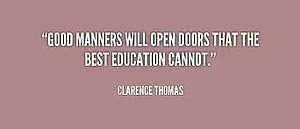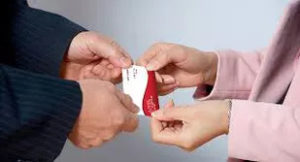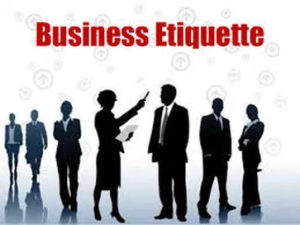“Etiquette is all human social behavior. If you’re a hermit on a mountain, you don’t have to worry about etiquette; if somebody comes up the mountain, then you’ve got a problem. It matters because we want to live in reasonably harmonious communities”.
Judith Martin
Recently, I heard from a friend in a management position who, after a couple of years, was finally invited to a business meal by his area manager. The ritual of sharing a meal not only serves to fulfill the need for sustenance but it can also be a powerful gesture when building relationships. This situation prompted me to consider some of the many forms of etiquette in business.
I’ve found that sometimes college fails us when it comes to business fundamentals, like etiquette. You may ask, “why would this be the responsibility of our educational system”? My response is that youth are more eager to glean information outside the confines of what they consider to be parental ranting, particularly about a mundane subject such as manners.

The Internet offers plenty of solid information relating to Business Etiquette. In fact, it appears to be an oft-written topic. So, in no particular order, here are some of the tips I gathered:
Always say your full name.
In a business situation, you should use your full name, but you should also pay attention to how others want to be introduced.
When in doubt, introduce others.
Always introduce people to others whenever the opportunity arises, unless you know that they’re already acquainted. It makes people feel valued, regardless of their status or position.
Always stand when you’re being introduced to someone.
Only say “thank you” once or twice during a conversation.
Otherwise, you may dilute its impact and possibly make yourself seem somewhat helpless and needy.
A handshake is still the professional standard.

Not only does this simple gesture demonstrate that you’re polite, confident and approachable, it also sets the tone for any potential future professional relationship.
Always say “Please” and “Thank you.”
This should go without saying, but even in a very casual professional atmosphere, this basic form of courtesy is still imperative.
Today, sending a thank you e-mail is perfectly acceptable, but a handwritten thank you note is always a nice touch.
Send separate thank you notes to everyone involved.
You should send thank you notes within 24 hours and you should send separate notes to everyone you want to thank.
Watch your language.
Verbal and written communications are often much less formal than in times past, but be careful to choose your words wisely. Of course, derogatory, rude or offensive language is unacceptable, but so is slang. While it may be commonplace in our society, it’s never acceptable in a professional atmosphere.
Double check before you hit “Send”.
Always check your e-mails for spelling and grammar errors.
Also, do a quick read to make sure the meaning and tone are what you wish to convey.
Whether it’s a company-wide function or a team dinner, ask the host/coordinator of the event before inviting your significant other.
Never pull out someone’s chair for them.
It’s okay to hold open a door for your guest, but Pachter says you shouldn’t pull someone’s chair out for them, regardless of gender. In a business setting, you should leave those social gender rules behind.

Keep your fingers together when you point.
Point with an open palm, and keep your fingers together. If you point with your index finger, it appears aggressive.
Always break bread with your hands.
Pachter says you should never use your knife to cut your rolls at a business dinner. Break your roll in half and tear off one piece at a time, and butter the piece as you are ready to eat it.
Do not push away or stack your dishes.
Never ask for a to-go box.
“You are there for business, not for the leftovers,” Pachter writes.
“Know where to properly place plates and silverware”, says Pachter.

“Remember that “left” has four letters and “right” has five letters. Food is placed to the left of the dinner plate. The words food and left each have four letters; if the table is set properly, your bread or salad or any other food dish, will be placed to the left of your dinner plate. Similarly, drinks are placed to the right of the dinner plate, and the words glass and right contain five letters. Any glass or drink will be placed to the right of the dinner plate”.
“Left and right also work for your utensils. Your fork (four letters) goes to the left; your knife and spoon (five letters each) go to the right”.
The host should always pay.
“If you did the inviting, you are the host, and you should pay the bill, regardless of gender. What if a male guest wants to pay? A woman does have some choices. She can say, ‘Oh, it’s not me; it is the firm that is paying.’ Or she can excuse herself from the table and pay the bill away from the guests. This option works for men as well, and it is a very refined way to pay a bill”.“However, the bottom line is that you don’t want to fight over a bill. If a male guest insists on paying despite a female host’s best efforts, let him pay.”
Be on time.
We’re all busy. Being punctual shows others that you value their time. Being late doesn’t mean that you’re busier than other people; it just means that you’re inconsiderate.
No phone during meetings.

When you’re in a meeting, focus on the meeting discussion. Don’t take calls, text or check e-mail. It’s disrespectful to the other attendees, not to mention, extremely annoying. It also makes meetings last longer because the participants keep losing focus.
Don’t be a business card pusher.

Don’t simply hand out business cards to everyone you meet. It’s a bit aggressive unless you’re on a sales call. Ask for the other person’s card, offer to exchange cards or at the very least, ask if you can leave your card before you reach in your pocket.
Show genuine interest.
Keep eye contact and make an effort to truly listen to what others are saying. We are so easily distracted in this climate of increasingly short attention spans; we often can’t wait for the other person to hurry up and finish so we can move on to the next thing. Resist the lure of distraction and haste. Take the time to ask questions and show an interest in the other person’s thoughts.
Don’t interrupt.
We’ve become a nation of “over-talkers,” so eager to offer our own opinions or press our point that we often interrupt others mid-sentence. It can be tongue-bitingly difficult to force ourselves not to interject, especially when the discussion is heated. Don’t. It’s rude and shows disrespect for the opinions of others. Remember, be assertive, not aggressive.
Avoid the “Big Two.”
We have blurred many of the personal and professional lines, but politics and religion are still off-limits. These topics are highly charged minefields for a professional atmosphere. Leave them at the office door.
Don’t walk into someone’s office unannounced.
It’s disrespectful to assume that you have the right to interrupt other people’s work. Knock on the door or say hello if it’s open and ask if it’s a good time to talk. If the discussion is going to take more than a few minutes, it’s a good idea to call or e-mail and schedule a good time for both of you.
Acknowledge others.
When someone approaches you, acknowledge him or her. If you’re in the middle of something important, it’s fine to ask them to wait a minute while you finish. If you pass someone in the hallway or on the street, but don’t have time to talk, at least wave a hand and say hello. Busyness is not an excuse to ignore people.
Prepare a polite exit.
Pachter says you need to be the one talking as you’re making the exit. “Remember to leave when you are talking. At that point, you are in control, and it is a much smoother exit.”You should also have “exit lines” prepared in case you need to leave a conversation. You can say “Nice to meet you” or “Nice talking to you” or “See you next week at the meeting.
You can also excuse yourself for a bathroom break, to get food, or say you wanted to catch someone before they leave.

“I make a distinction between manners and etiquette – manners as the principles, which are eternal and universal, etiquette as the particular rules which are arbitrary and different in different times, different situations, different cultures”.
Judith Martin
Another recent blog on the subject: https://www.thespruce.com/polite-words-and-phrases-1216714
Excerpts for this blog are from:
15 Business Etiquette Rules Every Professional Needs To Know, Vivian Giang
The Essentials of Business Etiquette, Barbara Pachter
15 Vital Business Etiquette Rules, Royale Scuderi
8 Business Etiquette Tips Everyone Should Follow, Amy Arndt, Huff Post



